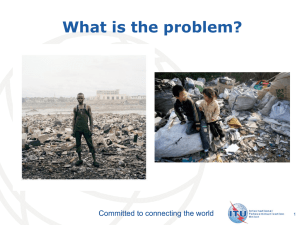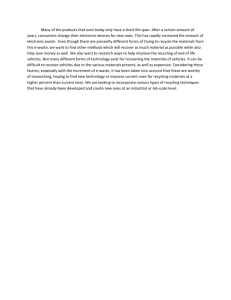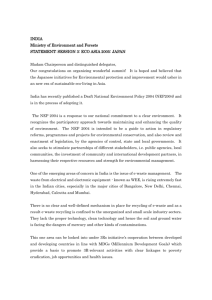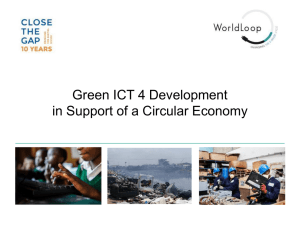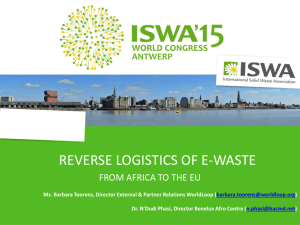Egyptian Green ICT strategy
advertisement
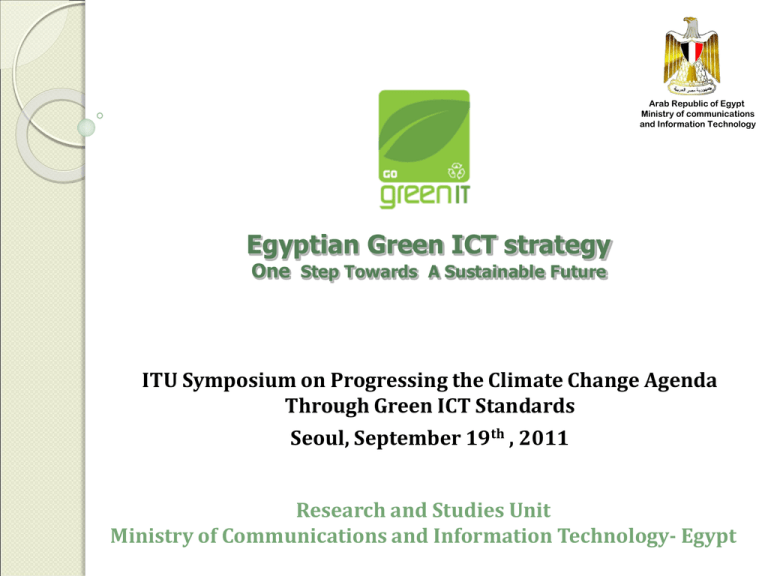
Arab Republic of Egypt Ministry of communications and Information Technology Egyptian Green ICT strategy One Step Towards A Sustainable Future ITU Symposium on Progressing the Climate Change Agenda Through Green ICT Standards Seoul, September 19th , 2011 Research and Studies Unit Ministry of Communications and Information Technology- Egypt Strategic Objectives • Contributing to the National Sustainable Development Approach In Egypt. • Reducing the adverse environmental effects resulting from the expansion in the use of Communications and Information Technology equipments. • Exploiting the enabling impact of the communications and information technology in mitigation and adaptation to CC, in other sectors (building, energy, etc...). Objectives Setting fundamentals and national policies for Green ICT. Bridging the gap between ICT, Environment, policy maker and stakeholders. Raising public and consumer awareness about “ICT& Environment” threats and opportunities. Building capacities and cadres in Green ICT field. Maximizing the diffusion of green ICT between all sectors Work Pillars 1 • Forming The Green ICT National committee. 2 • Raising Community awareness about the potential of green ICT, and ICT Green Standards in general. 3 • Seeking smart & Green ICT solutions for a sustainable future. 4 • Promoting national, regional and international cooperation. 5 • Life Cycle Sustainable Management of ICT Resources with special focus on E-waste. 1. Forming an Egyptian Green ICT National Committee 2. Raising Community Awareness on Green ICT Potentials Organizing workshops and sessions to raise community awareness about green ICTs (target segments: universities, schools, NGOs, Youth, children) Green ICT Workshops for Children The 5th ITU Symposium on “ICT, the Environment& Climate Change”November,2011 Schools & Universities Awareness Campaigns 2. Raising Community Awareness on Green ICT Potential Egypt’s Green ICT Portal and Info Share Green ICT Youth –Face book Group Guide booklets “Green IT in daily life” 3. Seeking Smart & Green ICT Solutions For a Sustainable Future 1. Smart Buildings ◦ Research & Development: Developing a report with ITU on “ICT’s Potential for Energy Saving and GHG Emissions reduction in the Built Environment-Egypt”. ◦ Leading by Example: MCIT, Ministry of Electricity, new and renewable Energy Authority, and Smart village company cooperating now, to implement a pilot project of “solar photovoltaic powered LEDS fixtures for street lighting system in Smart Village in Egypt”. 2. Smart Transportation ◦ MCIT in cooperation with Ministry of transport, and IBM-Egypt signed an MOU on “building an intelligent transportation system “. The main work pillars of the ITS are: 1. Building Intelligent road management and control system 2. Offering Asset management solutions to optimize the operational performance of assets and ensure high reliability and availability. 3. Establishing safety, security, Anti-collision system and surveillance. 4. Developing operations control solution 4. Promoting National, Regional and International Cooperation The World Bank...”Cooperation in the framework of knowledge Transfer”: ◦ Development of the framework of a National Green ICT strategy. ◦ Design of an E-waste pilot project ◦ Design of An Awareness, information dissemination and knowledge development campaign on E-waste management . ◦ Design of a curriculum for e-waste management and ICTs and climate change. Completed the TOR on “the diagnostic analysis and potentials for establishing an E-waste recycling industry in Egypt”. The International Telecommunication Union (ITU)...”Egypt as an Active party in relevant international issues”: Organizing the 5th ITU Symposium in November 2010 and issuing The Cairo Roadmap on “ICT and Environmental Sustainability”. 5. Life Cycle Sustainable Management of ICT Resources with Special Focus on EWaste E-waste Management Activities in Egypt (source: CEDARE) Legal Framework Level 1 – LOW Level 2 Level 3 Inventory Level 5 – HIGH Recycling & Reusing Technology No legal framework, strategy, or norms There is no inventory There is no collection There is no recycling/reusing mechanism Iraq, Kuwait, Lebanon*, Syria, Yemen Egypt, Iraq, Jordan, Lebanon*, Kuwait Egypt, Iraq, Jordan, Lebanon*, Yemen Iraq, Kuwait, Syria, UAE*, Yemen There is only plan to develop legal framework There is the inventory for municipal solid waste, but no designated inventory for Ewaste. E-waste is locally collected by local recyclers, scavengers, etc. without any legal framework. Only recyclable E-waste is well collected Only recyclable and reusable E-waste is recycled and reused by local stakeholders Bahrain, Egypt, Syria Bahrain, Syria, UAE*, Yemen Kuwait, Syria, UAE* Jordan A legal framework is being prepared and will be issued/enforced in very near future E-waste inventory is being prepared E-waste is well collected by local collection mechanism. Pilot separation and collection systems have been setup There is a plan to set up E-waste facility Tunisia* Bahrain, Egypt E-waste inventory is conducted, but lack of information and data Collection system for E-waste is operational and includes environmentally sound disposal There is E-waste Recycling facility, but not achieve to full operation for all E-waste in the country Morocco*, Tunisia Bahrain E-waste inventory is fully conducted and available on website Collection systems are fully operational. Our collection is recognized as a model system by other countries Jordan, Tunisia*, UAE* Level 4 Collection Enforcement, but the legal framework is not well conducted Full enforcement and model legal framework for other countries Source: CEDARE E-waste recycling facility is fully operated for all E-waste in the country and the model as the stat oft the-art recycling facility Tunisia* 5. Life Cycle Sustainable Management of ICT Resources with Special Focus on E-waste Legal Measures: Trade Measures: 1994 - Ratification of Basel Convention. 1994 - National Environment Law (amended 2009). 1995 - Waste Executive Regulations (amended 2005). 2002 - Waste Identification Act (amended 2009). 2004 - Ratification of the Ban Amendment. 2004 - Ratification of Bamako Convention. 2006 - Ratification of hazardous waste protocol of Barcelona Convention. Development of trade policies and regulations. Egypt commitments at CTE/WTO Egypt-EU Partnership Agreement/ EgyptEU Free Trade Agreement. Identification of used products/articles allowed for import. Continuous determination of industry needs (secondary raw materials e.g. used plastics, paper, glass…) Limitation of imports of used eproducts. Specific measure to protect local manufacture of EEE. (quality control, efficiency, incentives..…) 5. Life Cycle Sustainable Management of ICT Resources with Special Focus on E-waste Capacity Building and Education Building capacities and skills in the field of E-waste to meet the demand for skills and expertise at all levels and industries. Harnessing the concepts of Green ICT and E-waste management in the educational syllabus at all levels. Compiling Green ICT course with a special focus on sustainable management of E-waste for school students. Compiling E-waste management course for engineering students. Developing E-waste management diploma for postgraduates. 5. Life Cycle Sustainable Management of ICT Resources with Special Focus on E-waste E-waste Recycling Activities in Egypt: Company Core business: Refurbishment; re using; and remanufacturing ink and toner cartridges E-waste Recycling Practices in Egypt: EERC: Core business: Refurbishing process for old ICT products. Total Recycling / E-Waste Program EERC services: Complete IT upgrade services On-site data erasure Prepare old Equipments to be ready for Recycle Certified data erasure, packing old equipment. Environmental secure disposal Detailed report for every unit showing serial numbers, time, economics, process E-waste Recycling Practices in Egypt: Printers cartridges’ collection and recycling pilot project Re-use is an option to recycling because it extends the lifespan of a device . Mobinil leads awareness campaigns to provide enough information on that. Mobinil availed collection boxes and put them in companies to collect waste cartridge . Thousands of waste cartridges were collected using this method. E-waste Recycling Practices in Egypt: Printers Cartridges Collection and Recycling Pilot Project Avoiding the dumping of cartridges in landfills- Providing jobsSaving the air by reducing CO2- Customizing and selling Cartridges to Charitable associations and Hospitals , Saving customers’ money by reduce the cost of cartridge by 50% . Measures Taken by Egypt Trade Measures: - Identification of used products/articles allowed for import. - Continuous determination of industry needs. (secondary raw materials e.g. used plastics, paper, glass…) - Limitation of imports of used e-products. - Specific measure to protect local manufacture of EEE. (quality control, incentives..…) Source: MSEA Measures Taken by Egypt Technical Measures: - Reviewing of Documents. - Seals and locks of the containers. - Scan system. - Mobile Scan system. - Inspection of containers. - Open the container (Chick labels, certificate of origin, production date) - Target list of origins. - Ex-experiences of traders. - Vessel Control System. Source: MSEA Measures Taken by Egypt Institutional Measures: - Protocol between environment and ICT sectors - Institutional Development Program (Twinning - Germany). - Inter ministerial committee. - Board of council of the Egyptian Environment Agency. - Supreme committee for environment. - Green custom initiative practice. - National committee for trade and environment. - National canter for training custom officers. Source: MSEA Egyptian Green ICT Strategy: Next steps Developing an Info share platform to engage the public in the framework of setting the work plan of the Egyptian Green ICT strategy. Developing a proposal for setting up Green conditions and specifications in the public procurement of ICT goods, in line with global trends. Conducting a national E-waste assessment study .(the study expected to focus on the following (assessment of potentials for establishing an Ewaste recycling industry in Egypt, Identifying economic incentives , assessing the current amount of E-waste)- Proposal made to South Korea Designing of an Awareness, information dissemination and knowledge development campaign on E-waste management in cooperation with WB for government officials. Compiling Proposal for introducing & implementing take back system or “polluter pays principle” either in legislations or customers bills with EMPA and CEDARE. Compiling Proposal for setting and updating the appropriate legislations and regulations to support the rational management of E-waste in Egypt. “ITU- T SG5- Question 23; A Step Forward Towards Helping Developing Countries in Adapting to Climate Change” What are the standardization requirements for ICTs to enable adaptation to climate change? How can ICTs, in particular fiber submarine cable networks, be used more effectively to monitor the global environment/ecosystem and what new standards are required? How can ICT standards be used and adapted to more effectively disseminate information on both natural and manmade disasters (early warning) to communities (e.g. supporting GDACS under the UN framework? Identification if new ICT standards are needed to address food security, water transportation and supply in close collaboration with D sector. SG5/Q23 How can ICT standards better enable water management under accelerating climate change conditions to improve the overall efficiency of water use, leading to a more sustainable use of water resources? How can ICTs be used to reduce CO2e emissions by better waste management through a ‘cradle to cradle’, i.e. ‘closed loop’ approach whereby more efficient recycling means fewer raw materials need to be mined? How can ICTs be used in education and to raise awareness on climate change and what standards development is required? What e-health standards are needed for more effective healthcare, as diseases spread due to changing climatic conditions, and to ensure interoperability? SG5/23 Questionnaire: ITU SURVEY ON ICT AND CLIMATE CHANGE
